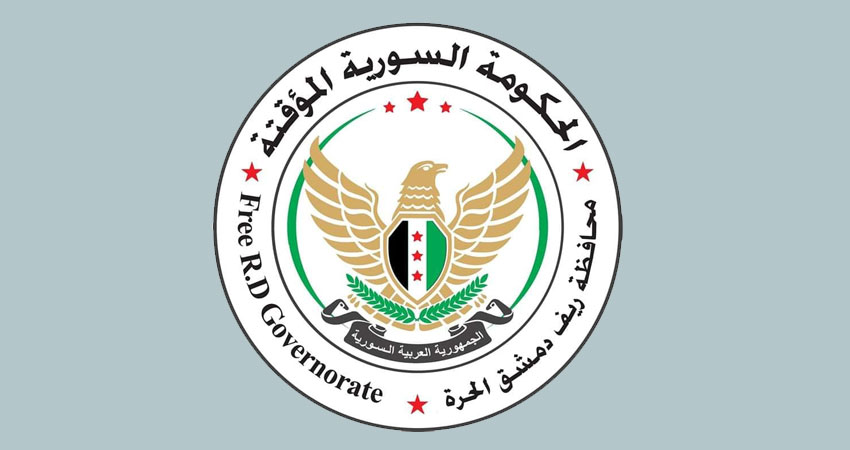Background
Seizing control over large parts of eastern Ghouta in late 2012, the opposition armed groups started forming bodies and set up institutions to replace those of the state in processing transaction and serving civilians. The opposition’s institutions started to operate effectively in 2013 and 2014, and the most important of which was the Rural Damascus Provincial Council of the Syrian Interim Government. Initially the work of those establishments contributed to the alleviation of suffering of civilians touched by war, but later misconducts of misappropriation, embezzlement and misuse of public funds occurred and led to prevent eastern Ghouta people from returns of supposedly useful projects.
According to statements made to STJ, the latest embezzlement from the Rural Damascus Provincial Council’s funds occurred in July 2018. Allegedly, a member of the Council embezzled more than 115 thousand dollars and was accordingly dismissed and prosecuted.
That incident was not the first of its kind, as on March 2018, a sum of 255 thousand dollars was misappropriated, and a leader of the Revolutionary Command Council in Damascus and its Countryside (RCCDC) was the suspect.[1] Further, the absence of accounting books and documents led to the loss of about 80 thousand dollars, which were allocated to cultivate wheat on 400 dunums in the village of Deir al-Asafir, in 2014, when the Council was newly formed.
According to information collected by STJ field researcher, the Rural Damascus Provincial Council still lacks an effective and independent oversight structure to monitor its actions and detect misconducts. The council also lacks clear laws and internal systems. Besides, some of its employees are still in positions, though found acting in favor of the armed groups they are loyal to.
It’s worth mentioning that STJ concealed identity of the witnesses it interviewed for their safety.
1. Establishment of Rural Damascus Provincial Council:
The Rural Damascus Provincial Council was formed in 2014 by the municipal management, which was already exist since 2013, at the request of the Interim Government of the National Coalition for Syrian Revolutionary and Opposition Forces. Delegators were selected from all the eastern Ghouta cities and towns based on the population of each. In turn the local councils in eastern Ghouta appointed their representatives for the council’s ‘general board’ as it was called.
The Rural Damascus Provincial Council implement relief and development projects or in some cases supervises the implementation and follow-up of projects. According to STJ researcher, after the Syrian regime fully control the eastern Ghouta in April 2018, the Council moved its activities to the north, specifically to some areas of Idlib and Aleppo like the town of Darat Izza and continues to operate till the date of this report January 7, 2019. One of its main tasks there is to form IDP representative committees towards constructing a department for IDP affairs.
2. The loss of about 80 thousand dollars owing to the absence of accounting books and documents
The Rural Damascus Provincial Council was one of the most important ‘revolutionary bodies’ in eastern Ghouta, as it used to provide many services to the people in rural Damascus. But, unfortunately, its funds, which was supposed to be dedicated to the public, have been stolen, embezzled or lost. This was confirmed to STJ by one of the Council’s members-who asked anonymity for security reasons- saying:[2]
“The preliminary structure of the Rural Damascus Provincial Council emerged in early 2014. It was then called the Eastern Ghouta Office and followed the so-called municipal management. The Council failed to manage the huge funds it received, since there were no proper books of account. The ‘Agricultural Project’, which targeted the cultivate of wheat on 400 dunums in the village of Deir al-Asafir, was one of the most significant projects undertook by the council, as the amount allocated for it reached 80 thousand dollars. However, the project’s funds gone, and we couldn’t tell where, since we have no accounting books traced the movement of funds.”
This was attested to by A.B., a former member of the free Rural Damascus Provincial Council’s executive office, who had access to the drafts of all the projects entrusted to the Council during his tenure. A.B talked to STJ saying:[3]
“The ‘Agriculture Project’, which was initially called the Food Security Project no.1, was one of the projects the council was mandated to implement. Pursuing our tasks, we examined the documents of the disbursement of this project’s funds. We realized that there were no clear figures explain where the money was spent, or where the wheat production distributed. The project, which was funded in the amount of $80.000 to cultivate 400 dunums in the village of Deir al-Asafir, lacked proper governance and was controlled by powerful people who acted in their own favor, which resulted in the civilians’ deprivation of the project’s returns.”
With the beginning of 2015, the name of the council changed from the Eastern Ghouta Office to the Rural Damascus Provincial Council, as the source added to STJ and went on to say:
“Earlier that year, elections were held to select new members for the new office and among those chosen was A.A. The management changes revealed dysfunctions in the former administration, which were not addressed by the new staff who also made errors, misappropriations and robberies. The most notorious recorded incident was the robbery of relief items from warehouses in the central sector, as the regime tightened siege on eastern Ghouta in October 2017. Some powerful men and others closely linked to armed groups in control, stole large quantities of food aid stuff from warehouses and opened their doors to civilians and incited them to rob what was left.”
In an earlier report STJ documented the robbery of those warehouses mentioned by the witness. The report said that several masked gunmen, reportedly belong to the al-Rahman Legion/ Faylaq al-Rahman group, stormed food warehouses in the town of Hamoryah, rural Damascus, and looted all their contents (flour, sugar and milk), which were supposed to be distributed to the trapped civilians within days.[4]
3. The embezzlement of more than 255 thousand dollars from the Rural Damascus Provincial Council
Large sums of public funds misappropriated amidst mutual recrimination among the ‘opposition elements’, as confirmed by J.M., an employee at the Rural Damascus Provincial Council, who preferred anonymity for security reasons, saying:[5]
“When the Syrian Army stepped up its offensive against the eastern Ghouta in February 2018, it left no safe areas, especially after it seized the town of Hamoryah in the middle of March 2018, which was had the main headquarters of Rural Damascus Provincial Council. At the time, the financial officer of the Council, A. al-Nae’m, entrusted the then head of RCCDC, Yaser al-Qaderi, known as Abu Muhammad al-Fateh, with 255 thousand dollars, but the money later disappeared. When asked to justify that loss, al-Qaderi claimed giving them to the al-Rahman Legion leader, who, in turn, alleged that the entire amount used in servicing eastern Ghouta. That led to a serious tension, and mutual accusations in public statements between commanders of the al-Rahman Legion and officials in the Rural Damascus Provincial Council, which resulted in the latter to file a lawsuit against the former in the court of A’zaz in northern rural Aleppo.”
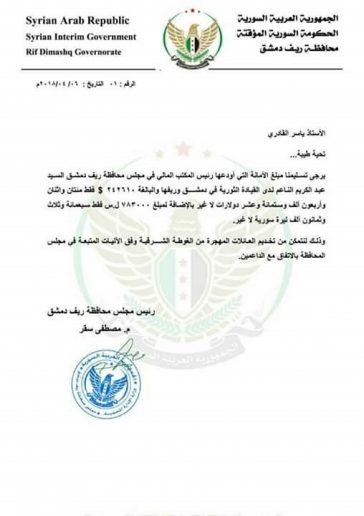
The letter issued by the Free Rural Damascus Provincial Council on April 6, 2018 through which it demanded the money from Y.al-Qaderi. Photo credit: the witness J.M.
In response, RCCDC sent a letter on April 15, 2018, in which it explained that it placed the amount at the disposal of the captain Abdul Nasser Shumeir, a commander of the al-Rahman Legion after being elected by heads of secretariat departments in the local councils to be in overall charge of eastern Ghouta affairs during that period “
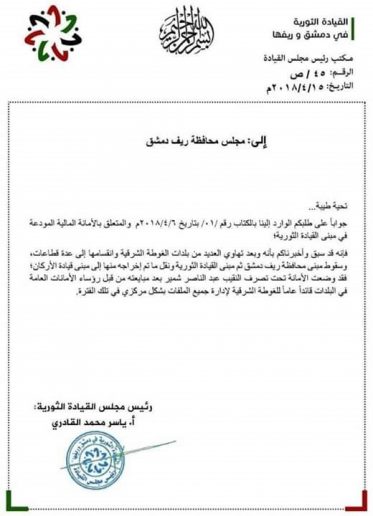
The letter issued by the RCCDC on April 15, 2018. Photo credit: the witness J.M.
The free Rural Damascus Provincial Council responded in a statement, on April 18, 2018, demanding the captain Abdul Nasser Shumeir to give back the amount put at his disposal by the RCCDC.
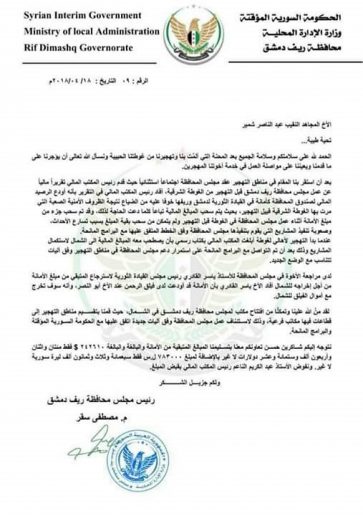
The letter issued by the Rural Damascus Provincial Council on April 18, 2018. Photo credit: J.M.
In a further statement, the Provincial Council reiterated its call for Abdul Nasser Shumeir and Yaser al-Qaderi to give the amounts back informing them that they are under prosecution.
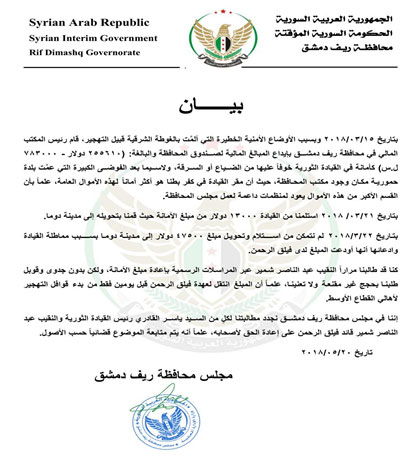
The statement issued by the Rural Damascus Provincial Council on May 20, 2018 in which it stated the entrustment of 255 thousand dollars to the RCCDC in the eastern Ghouta. Photo credit: The Rural Damascus Provincial Council channel on Telegram.
In turn the al-Rahman Legion responded in a letter issued on May 21, 2018, claiming that the amount was spent on ‘bringing supplies for the battle and the jihadists and on strengthening resilience’ and it denied keeping the money in trust.
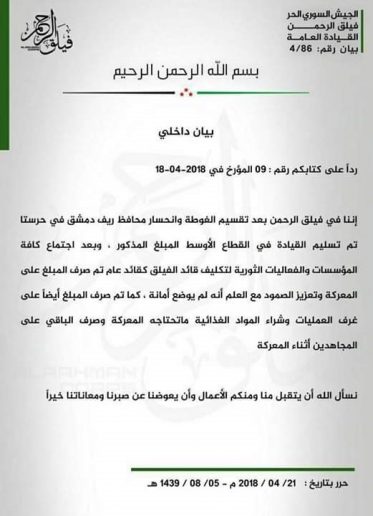
The letter issued by the al-Rahman Legion on May 21, 2018. Photo credit: the witness J.M.
4. The theft and embezzlement of more than 115 thousand dollars
In another incident the Rural Damascus Provincial Council issued a statement accusing its employee Z.F. of stealing an amount of 115 thousand dollars, as confirmed by the first witness interviewed in this report who told STJ saying:
“Z.F. was a member of the Rural Damascus Provincial Council since early 2016 till mid-2017. Being nominated as the director of the Project Management department, Z.F. had the full authority over the projects and funds dedicated to eastern Ghouta and his strong ties to power brokers of the region allowed him to act according to his own preferences and procedural conveniences. In July 2018, Z.F. left for Istanbul, Turkey for his mother’s medical treatment, the Council’s office there gave him an amount of about 115 thousand dollars to keep it in trust. However, when the Council asked to restore the money, he stalled and eventually refused to give it back alleging the spend of the amount on servicing eastern Ghouta. Accordingly, Z.F. was dismissed and prosecuted by the council., and he, in turn, cut off all the means of contact with him.”
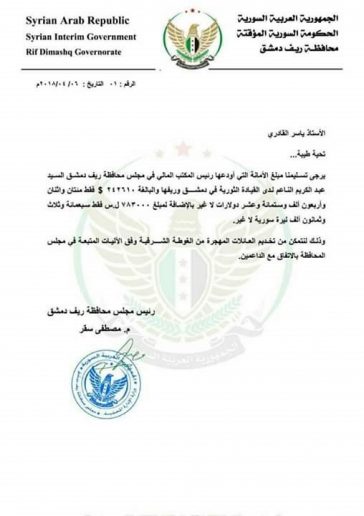
The statement issued by the Rural Damascus Provincial Council on October 23, 2018, about the entrustment of Z.F. with 115 thousand dollars. Photo credit: The Rural Damascus Provincial Council channel on Telegram.
In the same vein, the lawyer R.M. from eastern Ghouta, who was acquainted with the lawsuits filed by the free Rural Damascus Provincial Council for the embezzlement of its funds, said to STJ:[6]
“Two lawsuits were brought before the court of Afrin. The first was transferred to it from the court of A’zaz in September 2018 and it was against the RCCDC for its misappropriation of an amount of 243 thousand dollars, entrusted to it by the Provincial Council due to insecurity and chaos in eastern Ghouta at the time. This suit was filed directly against Yaser al-Qaderi, as he was the head of the General Secretariat department of the RCCDC in eastern Ghouta. However, the case is still at the stage of preliminary objections, as al-Qaderi pleaded not guilty and demanded the implication of the al-Rahman Legion in the lawsuit as a third litigant. As for the second lawsuit, it was filed to Afrin court in November 2018 against Z.F. who received a sum of 115 thousand dollars from the Council’s office in Istanbul in order to send it to the Council’s office in Syria, but he didn’t. This suit is also at the preliminary objections stage, we, however, tried to bring it to the Turkish courts, but the difficult procedures made that not possible.”
According to the lawyer, Z.F. claimed that the council spent the amount imprudently and not on the projects it was allocated for.
STJ researcher who worked on this report tried to contact Z.F. to get a statement from him but the latter was unreachable.
STJ managed to obtain a copy of the statement made by Z.F. through which he denied accusations levelled against him and stressed that the amount he received was allocated for the project of shelter rehabilitation. Noting that the project was implemented indeed during the last offensive on eastern Ghouta.
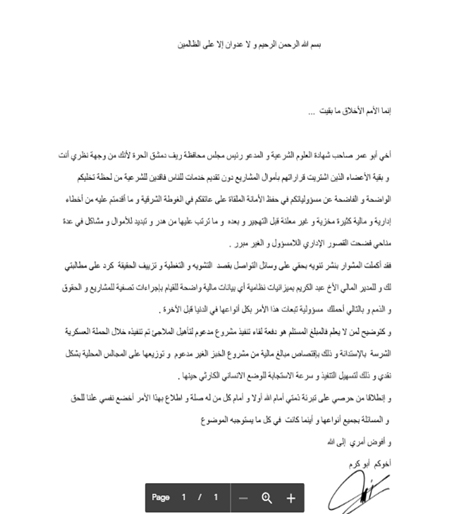
The statement of Z.F. answering the charges against him. Photo credit: exclusive sources acquainted with the case.
The statement of Z.F. answering the charges against him. Photo credit: exclusive sources acquainted with the case.
The council’s governance failure was not limited to the financial matters, as confirmed by the media activist Hasan Nu’man who talked to STJ saying:[7]
“I have asked for a copy of the Council’s internal regulations and was shocked to receive three different versions! Besides, I realized that all the armed groups in control interfered in the work of the council and the decisions it made. Recently, rumors started about the will to dissolve the Rural Damascus Provincial Council to be replaced by another body under a different name, aiming at closing files and cases brought against it.”
—-
[1] The Revolutionary Command Council in Damascus and its Countryside (RCCDC) formed in September 2017 by the local councils in the central sector (Hamoryah, Zamalka and Ein Tarma) in eastern Ghouta, along with other institutions and organizations to conduct the affairs of this sector which was controlled by The al-Rahman Legion.
[2] The witness has displaced from eastern Ghouta to north Syria, from where he was interviewed online by STJ field researcher in October 2018.
[3] STJ interviewed the witness online in mid-February 2019.
[4] “Robberies and Lootings of Civil Institutions and Organizations in Eastern Ghouta, Damascus Countryside”, STJ, November 12, 2017 https://stj-sy.org/en/313/.
[5] The witness has displaced from eastern Ghouta to north Syria, from where he was interviewed online by STJ field researcher in October 2018.
[6] The witness was interviewed online in mid-February 2019.
[7] The witness has displaced from eastern Ghouta to north Syria, from where he was interviewed online by STJ field researcher in October 2018.

